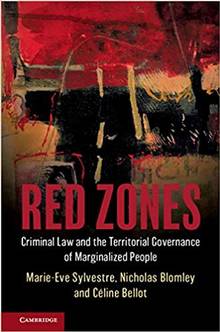Red Zones: Criminal Law and the Territorial Governance of Marginalized People
Sylvestre, Marie-Eve / Blomley, Nicholas / Bellot, Céline
Éditeur : CAMBRIDGE UNIVERSITY PRESS
ISBN papier: 9781316635414
Parution : 2020
Code produit : 1398042
Catégorisation :
Livres /
Droit et sciences juridiques /
Droit et sciences juridiques /
Droit pénal
Formats disponibles
| Format | Qté. disp. | Prix* | Commander |
|---|---|---|---|
| Livre papier | En rupture de stock** |
Prix membre : 31,73 $ Prix non-membre : 35,25 $ |
*Les prix sont en dollars canadien. Taxes et frais de livraison en sus.
**Ce produits est en rupture de stock mais sera expédié dès qu'ils sera disponible.
Description
In Red Zones, Marie-Eve Sylvestre, Nicholas Blomley, and Céline Bellot examine the court-imposed territorial restrictions and other bail and sentencing conditions that are increasingly issued in the context of criminal proceedings. Drawing on extensive fieldwork with legal actors in the criminal justice system, as well as those who have been subjected to court surveillance, the authors demonstrate the devastating impact these restrictions have on the marginalized populations - the homeless, drug users, sex workers and protesters - who depend on public spaces. On a broader level, the authors show how red zones, unlike better publicized forms of spatial regulation such as legislation or policing strategies, create a form of legal territorialization that threatens to invert traditional expectations of justice and reshape our understanding of criminal law and punishment.























